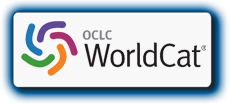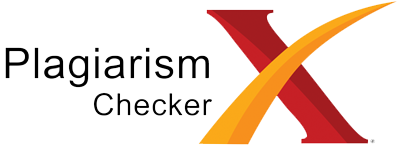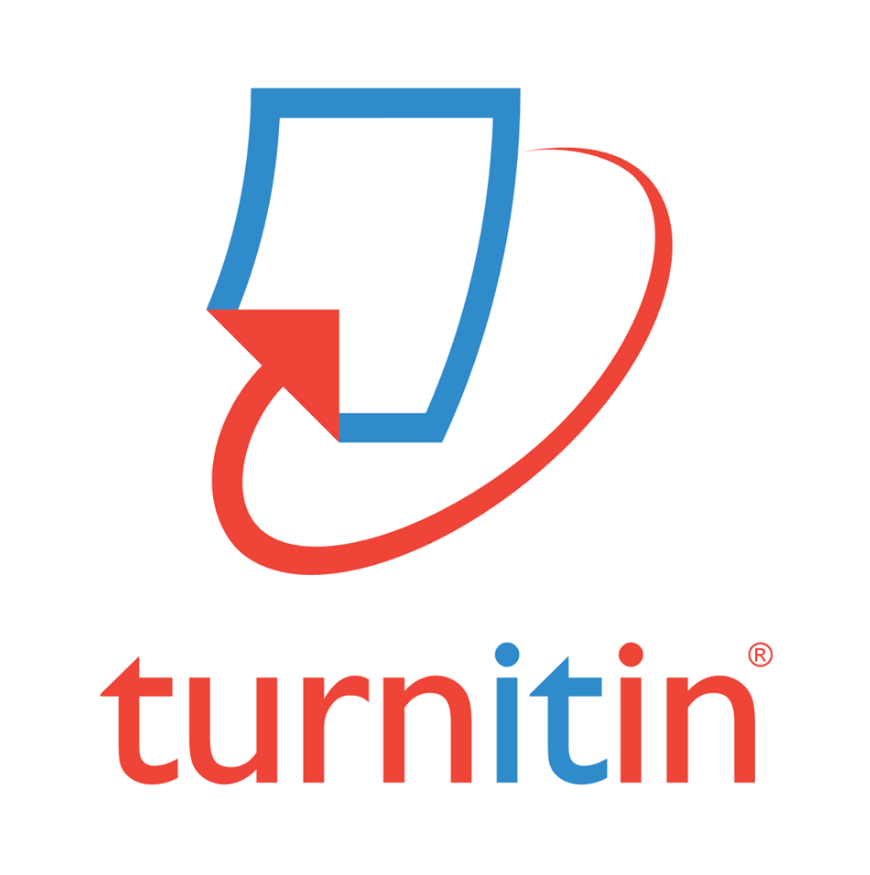The Impact of Creative Problem Solving Strategy VS Learning Cycle Model and Cognitive Style on The Understanding of Comparison Concept
Abstract
Abstract: This study aims to examine the differences in the understanding of the comparison concept in groups of students who take realistic mathematics learning through the Creative Problem Solving (CPS) and Learning Cycle Model (LCM) strategies. It also examines the differences in the understanding of comparison concept between groups of students who have Field Independent (FI) and Field Dependent (FD) Cognitive Style. Lastly, it examines whether there is an interaction between learning strategies and Cognitive Style towards the students’ understanding of the concept of comparison. This study uses quasi-experimental research design, with 2x2 factorial design pretest-posttest nonequivalent control group design. Data analysis uses two-way ANOVA by utilizing SPSS statistical software version 22 for windows. The subjects of this study were 53 seventh-grade students of Islamic junior high school (MTs) Azzainabiyah Pramian Sampang Madura, consisting of 2 classes (experimental class and control class) with non-random assignment. The instrument used in this study is the Cognitive Style test called GEFT (Group Embedded Figure Test) and learning outcomes test. The results of this study indicate that there is no difference in the understanding of the concept of comparison in groups of students who take realistic mathematics learning through CPS and LCM strategies. There is a difference in the understanding of the concept of comparison between groups of students who have FI and FD cognitive style. There is no interaction between the strategy of learning with the cognitive style possessed by students towards the understanding of the concept of comparison.
Keywords
Full Text:
PDFReferences
Adnyani, Sadia, Natajaya, 2013. Pengaruh Strategi Pembelajaran Konflik Kognitif Terhadap Penurunan Miskonsepsi Fisika Ditinjau dari Gaya Kognitif Siswa Kelas X di SMA Negeri 1 Bebandem. (Online)https://journal.ac.id/index.php/cp/article/view/1560 Diakses: 1 Desember 2017.
Baiduri, 2015. Gaya Kognitif dan Hasil Belajar Siswa Field Dependence-Independence. (online) https://media.neliti.com.publication Diakses: 31 Mei 2018.
Boud, D. & Fellati, G.I., 1997. The Challenge of Problem Based Learning. London: Kogapage.
Catherine N. S., 2012. Prilaku Komunikasi Nonverbal Guru Dalam Kelas Pembelajaran: Maknanya Bagi Siswa SMA. (online). https://scholar.google.co.id. Diakses 2 Agustus 2018.
Degeng, I N. S., 1989. Teori Pembelajaran I: Taksonomi Variabel. Jakarta: Program Magister Manajemen Pendidikan Universitas Terbuka.
Degeng, I N. S., 2008. Pengembangan Model Pembelajaran, Teknologi Pembelajaran. Malang: Fakultas Ilmu Pendidikan IKIP Malang.
Degeng, I N. S., 2011. Mencari Paradigma Baru Pemecahan Masalah Belajar. Universitas PGRI Adi Bana.
Degeng, I N. S., 2013. Ilmu Pembelajaran. Klasifikasi Variabel untuk Pengembangan Teori dan Penelitian. Bandung: Aras Media.
Fogarty, R., 1997. Problem-Based-Learning and The Other Curriculum Models for Multiple Intelligences Classroom. Hawker Brownlow Education.
Hadi, 2017. Pendidikan Matematika Realistik. Jakarta: Rajawali Pers.
Haji, S., 2005. Pengaruh Pendekatan Matematika Realistik Terhadap Hasil Belajar Matematikadi Sekolah Dasar. Disertasi. PPs Unsuri Bandung. Tidak dipublikasikan.
Hisyam Z. dkk, 2008. Strategi Pembelajaran Aktif. Yogyakarta: Pustaka Insan Madani.
Khafid, 2013. Pengaruh Pembelajaran Berbasis Masalah dan Gaya Kognitif Terhadap Hasil Penanaman Wawasan Kegeografian. (Online) http://journal.um.ac.id/index.php/pendidkan-dan-pembelajaran/article/view/4394 Diakses: 1 Desember 2017.
Madiya, 2012. Pengaruh Model Pembelajaran Berbasis Masalah Terhadap Prestasi Belajar Kimia dan Konsep Diri Siswa SMA Ditinjau dari Gaya Kognitif. (Online) http://pascha.undiksha.ac.id/e-journal/index.php/jurnal_ipa/article/view/477 Diakses: 1 Desember 2017.
Mukhlason, Degeng, I N. S.,& Sihkabuden, 2015. Pengaruh Strategi Pembelajaran (Peta Konsep dan Rangkuman) dan Motivasi Berprestasi Terhadap Hasil Belajar Pembelajaran Sejarah. (online). https://scholar.google.co.id. Diakses 26 Juli 2018.
Nurbani D., Gusrayani D., Jayadinata A. K., 2016. Pengaruh Model Learning Cycle Terhadap Keterampilan Proses Sains Siswa SD Kelas IV pada Materi Hubungan Antara Sifat Bahan Dengan Kegunaannya. (online). https://scholar.google.co.id. Diakses 2 Agustus 2018.
Pranandari I. K., Degeng, I N. S.,& Fattah H., 2016. Korelasi Antara Persepsi Siswa Tentang Pengelola Kelas, Hubungan Teman Sebaya (PEER RELATIONSHIP), dan Hasil Belajar Siswa Kelas IV SD Negeri Kecamatan Sanawetan Kota Blitar. (online). https://scholar.google.co.id. Diakses 2 Agustus 2018.
Resvirenol, 2015. Pengaruh Strategi Pembelajaran Berbasis Masalah Terhadap Hasil Belajar Mahasiswa yang Memiliki Gaya Kognitif Berbeda. (Online) http://jurnal.119.252.161.254/e-journal/index.php/jurnal_ap/article/view/956 Diakses: 1 Desember 2017.
Rufi’i, 2010. Pengaruh Strategi Pembelajaran dan Gaya Kognitif Terhadap Perolehan Belajar Konsep dan Prosedur Statstik. Disertasi tidak diterbitkan. Malang: PPSJ Teknologi Pembelajaran Universitas Negeri Malang.
Santoso, 2005. Metodelogi Penenlitian Kuantitatif dan Kualitatif. Jakarta: Prestasi Pustaka.
Sari, Suherman, Mirna. 2014. Pengaruh Model Pembelajaran Learning Cycle Terhadap Pemahaman Konsep Matematika Siswa Kelas X SMA Negeri 15 Padang Tahun Pelajaran 2013/2014. (Online) https://scholar.google.co.id/scholar?statr=10&q=matematika+realistik&hl=en&has_sdt=0,5 Diakses: 1 Desember 2017.
Shiomin, A. 2014. 68 Model Pembelajaran Inovatif Dalam Kurikulum 2013. Yogyakarta: Ar-Ruzz Media.
Soviawati, 2011. Pendekatan Matematika Realistik (PMR) untuk Meningkatkan Kemampuan Berfikir Siswa ditingkat Sekolah Dasar. (Online) https://scholar.google.co.id/scholar?statr=10&q=matematika+realistik&hl=en&has_sdt=0,5 Diakses: 1 Desember 2017.
Sudirman, N. dkk, 1992. Ilmu Pendidikan. Bandung: Remaja Rosdakarya Offset.
Sutinah, Degeng, I N. S.,& Akbar, S., 2008. Model Pembelajaran Kooperatif Tipe Students Team Achievment. (online). (ejournal.um.ac.id) Diakses 26 Juli 2018.
Stenberg, R. J. dan Elena L. G., 1997. Are Cognetive Style Stiil in Style?. American Psychologist Association, Volume 52, No. 7. Hal 700-712
Ulya, 2015. Hubungan Gaya Kognitif Dengan Kemampuan Pemecahan Masalah Matematika Siswa. (Online) jurnal.umk.ac.id.article.viewFile Diakses: 31 Mei 2018.
Widodo, A., Wuryastuti, S. & Margaretha. 2010. Pendidikan IPA di Sekolah Dasar. Bandung: UPI Press.
DOI: http://dx.doi.org/10.17977/um039v4i12019p074
Refbacks
- There are currently no refbacks.
Copyright (c) 2019 Edcomtech Jurnal Kajian Teknologi Pendidikan

This work is licensed under a Creative Commons Attribution-ShareAlike 4.0 International License.
Edcomtech: Jurnal Kajian Teknologi Pendidikan published by Department of Educational Technology, Faculty of Education, State University of Malang in Collaboration with Asosiasi Program Studi Teknologi Pendidikan Indonesia (APS TPI) and Ikatan Profesi Teknologi Pendidikan Indonesia (IPTPI) with MoU.
Publisher Address:
Lab. Teknologi Pendidikan, Gd.E2, Lt.1
Fakultas Ilmu Pendidikan Universitas Negeri Malang
Jalan Semarang No 5, Kota Malang Kode Pos 65145
Email: edcomtech.fip@um.ac.id
========================================================================================================
| INDEXED BY | TOOLS | PLAGIARISM CHECK | ARTICLE TEMPLATE |
|

Edcomtech is licensed under a Creative Commons Attribution-ShareAlike 4.0 International License.
Edcomtech Statistics (Since July 13th, 2020)

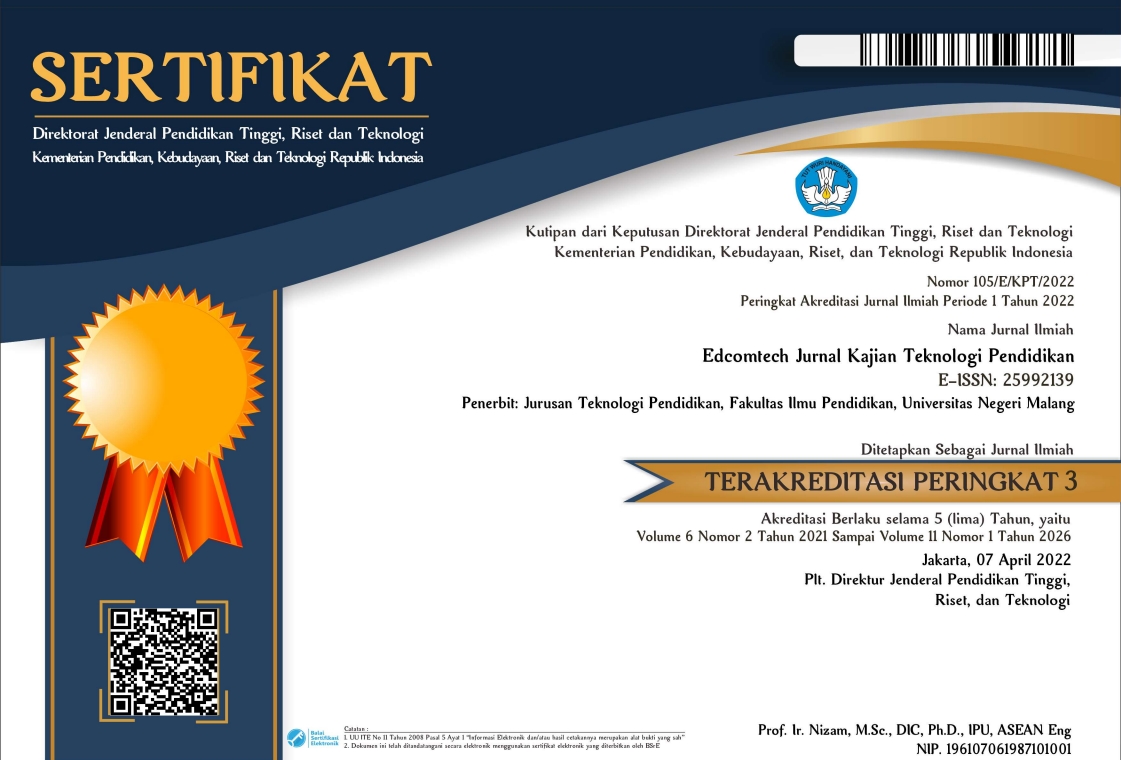



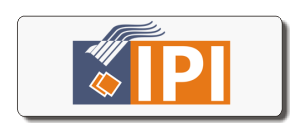





1.png)
